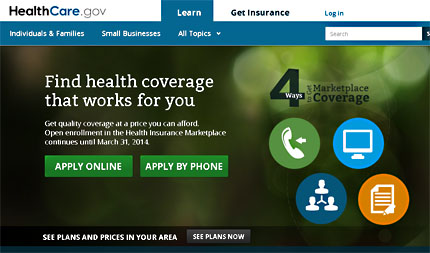 Sam Baker has a long piece in National Journal about a looming Obamacare problem that could hit a lot of people who renew their coverage later this year. Here’s the short version: federal subsidies are calculated based on a “benchmark” plan, and this means that low-income taxpayers can buy the benchmark plan at pretty low cost. However, since Obamacare encourages competition (yay!), your region might have a whole bunch of new, lower-cost plans available next year. This means the benchmark will be recalculated, and if you want to keep your low payments you’ll need to switch to one of the newer plans.
Sam Baker has a long piece in National Journal about a looming Obamacare problem that could hit a lot of people who renew their coverage later this year. Here’s the short version: federal subsidies are calculated based on a “benchmark” plan, and this means that low-income taxpayers can buy the benchmark plan at pretty low cost. However, since Obamacare encourages competition (yay!), your region might have a whole bunch of new, lower-cost plans available next year. This means the benchmark will be recalculated, and if you want to keep your low payments you’ll need to switch to one of the newer plans.
But what if you don’t? What if you just auto-renew without thinking about it? Since you’re no longer buying the benchmark plan, your subsidies will go down and your annual premium will go up. Maybe a lot:
As cheaper plans come into the marketplace, millions of consumers will see the cost of keeping their plan rise. But they might not know it.
HealthCare.gov isn’t able to automatically recalculate the subsidies existing consumers are eligible for. So, while the dollar value of your financial assistance drops, you can only find out that’s happening by going back into the system and asking for a redetermination as part of the shopping process.
Consumers who auto-renew their policies will get the same dollar value of subsidies they got last year—even though changes in the marketplace all but guarantee that will no longer be the right subsidy amount for millions of people.
“That’s the totally crazy part,” Pearson said. “They’re basically going to send them what they know to be the wrong subsidy.”
The IRS will eventually figure out how much financial assistance you should have received, and will reconcile the difference on your taxes. If you should have gotten a bigger subsidy, the government will issue you a tax credit. If your subsidy was too big, which would be the case if you keep your plan and lower-cost options come to the market, you’ll owe the IRS money.
This puts everyone in a tough spot. HHS officials want to make auto-renewal as simple and automatic as possible. Long experience shows that even a little bit of added complexity will reduce the rate of sign-ups. But a simple auto-renewal runs the risk of misleading people about how much their insurance costs if they don’t switch to a new plan. What to do?
In broad terms, this is yet another bit of fallout from the sausage-making process that created Obamacare. In order to get a bill passed, it had to satisfy lots and lots of interest groups. In order to satisfy those interest groups, the structure of the program was made complex. And then, barnacles were added to barnacles to further satisfy everyone. The result is stuff like this.
In narrower terms, this might have a technical fix: add a few steps to the auto-renewal process that make the cost of renewing more transparent. Given the number of people who signed up initially despite the horrific rollout problems with healthcare.gov, I suspect this wouldn’t have a huge impact on renewal numbers. And it might save a boatload of grief down the line.
In any case, if you or a friend is enrolled in Obamacare, here’s the bottom line: don’t just mindlessly auto-renew. Take a few minutes to find out if anything has changed that affects your annual premiums. Don’t wait till next year to find out via a letter from the IRS.















